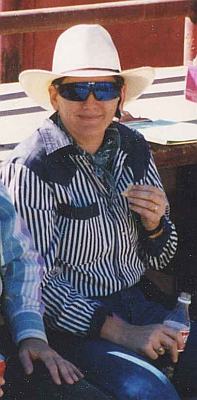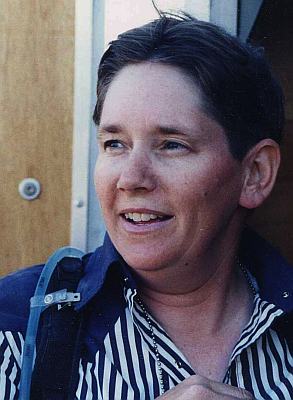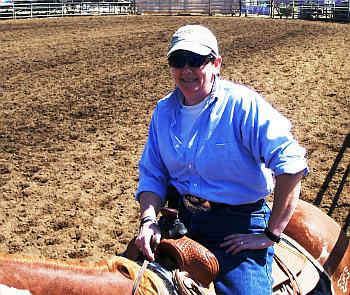
Erin Eaton
April 28, 1962 - February 14, 2010
First attended a gay rodeo in 1984
Involved in gay rodeo through 2008
Inducted 2011
Erin Eaton was born April 28, 1962 in Frankfort, Indiana. When she was three her family moved to St. Louis, and at age 4 her family moved again, this time to Lexington, Kentucky. Growing up in any of these locations would have afforded her the opportunity to eventually get involved with gay rodeo, but at the age of 8 her family moved one last time; and it was to Round Rock, Texas , which was a rural suburb north of Austin.
Eaton did not grow up living on a ranch, and like many of the men and women involved with gay rodeo she never owned a horse. Erin did get to spend several summers attending day-camps where she did develop her love of horses. After graduating from high school Erin attended Texas A&M, where she majored in Forestry. Erin became a member of the Texas Gay Rodeo Association (TGRA) as soon as it was formed in June 1983, but she was not particularly involved that first year. Soon after college graduation in 1984, Erin was employed by the State of Texas as a Park Ranger, where she had high hopes of using her college education to perfect her skills in forest management. She soon learned that Junior Park Rangers cleaned bathrooms and policed the campgrounds. Erin also realized that a whole bunch of Senior Park Rangers would need to retire or die before she would get a promotion.
In November 1984 Texas hosted its first gay rodeo near Houston. When Erin arrived she knew she had to get involved somehow, so she worked as a Secretarial volunteer. The "Rodeo Bug" bit Erin hard at that first rodeo, and she worked in the chutes at her next two rodeos in 1985: Denver and Texas. It was during this time frame when Erin met and developed a relationship with Jeannine Tuttle, who was also volunteering and competing in the rodeos. Jeannine's father owned several heating, ventilation, and air conditioning (HVAC) parts supply franchises, and enticed Erin and Jeannine to move to California right after the 2nd TGRA rodeo.

They were both successful in learning the HVAC parts business, and their jobs allowed them time to increase their participation in rodeo. The Golden State Gay Rodeo Association (GSGRA) had already produced the first L.A. Rodeo, and they immediately became very active members. In 1986 and 1987 Erin worked in the bucking and roping chutes at the LA Rodeos, as well as in Phoenix. Erin continued working in the chutes for the Phoenix Road Runner Regional Rodeos for several years, as well as adding rodeo venues in San Francisco, San Diego, Tucson, and Seattle. Erin was also in charge of the chutes at the first four IGRA Finals Rodeos, which were located in Hayward, CA; Reno, NV; and Phoenix, AZ two consecutive years. When IGRA created the Certified Chute Coordinator positions in 1988 Erin was "Grandfathered" in as a Chute Coordinator, and in the early 1990's she Chaired the Chute Coordinator Committee and conducted training seminars.
In 1988, Erin began training to be an Arena Director and was the assistant at the LA Rodeo. Erin also became more involved with GSGRA, and in 1989 and 1990 she was on the Board of Directors, as well as the Rodeo Director for the LA Rodeo.
After Erin and Jeannine separated, Erin met Tracy Keiper at the 1993 San Diego Rodeo. Erin and Tracy formed a fast and strong relationship. They moved into a home where Erin helped Tracy raise her two children, Jenn and Jon; eventually getting both through high school and on to their own lives. In the summer of 1996, Erin and Tracy were married in Upland, California.
Erin was Arena Director for San Diego Rodeo for 19 years (1990-2008), and for LA Rodeo for 16 years (1992-2008). In addition, she was Arena Director in many other locations, including: San Francisco Bay Area Rodeo; Palm Springs Hot Rodeo; Phoenix Road Runner Regional Rodeo; Las Vegas Bighorn Rodeo; Albuquerque Zia Regional Rodeo; Seattle Greater Northwest International Rodeo; Salt Lake City Utah Gay Rodeo; and Atlantic States Atlantic Stampede. Erin was also Arena Director for IGRA Finals Rodeos in Albuquerque in 1996 and 2000; Phoenix in 1997; and Palm Springs in 2001.
Erin's focus as an Arena Director was most importantly to provide a safe rodeo for animals, contestants, and staff; and she always tried to do so in a way that was fun for the participants and as efficient as possible. During the 1994 LA Rodeo, Erin had to move the running of horse speed events from the Main Arena to the warm-up arena for safety. Two horses had slipped and gone down while trying to turn at the first barrel. The horses were not injured, and the speed events were completed at the alternate arena with no further mishaps. Erin realized how much better this was for the safety of animals and contestants. She also realized that with more than 200 total contestants and 60 horse contestants, a 13 hour long rodeo could be shortened to 9 or 10 hours by having Rough Stock events in one arena while Horse Speed events were going on in a second arena. At the 1995 LA Rodeo the two arena concept proved beneficial in improving safety, efficiency, and fun.

Outside the rodeo arena Erin spent countless hours helping to train volunteers, officials, and contestants in rodeo safety. She helped individuals become part of a team. GSGRA has a rodeo equipment trailer that is taken from rodeo to rodeo. After every rodeo Erin would go through the equipment to make sure that everything would be ready for the next rodeo.
In 2000, and again in 2008, the San Diego Rodeo gave Erin the honor of Grand Marshall for her 20 years of service to their annual rodeo. In 2011, IGRA honors Erin with induction into the Hall of Fame for her service to many IGRA rodeos; from Erin's first 1984 TGRA rodeo as a Secretarial volunteer through her last rodeo as Arena Director for the 2008 San Diego Rodeo.
A short time after Erin's retirement from rodeo she was diagnosed with cancer. Erin passed away on Valentine's Day, February 14, 2010. The Ceremony of the Riderless Horse symbolizes the end of the relationship between horse and rider. Erin will always have her place at our rodeos; still loved; still missed.